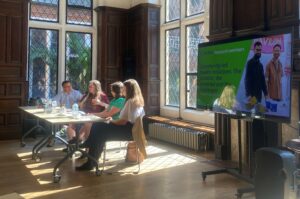What research tells us about community-led health responses
Towards the end of April, we hosted the latest in our academic seminar series. This time we focused on community responses to health – thinking about communities’ roles in providing preventative health interventions as well as in working in partnership with health services to promote community-based activity and improve access to mainstream healthcare. In this blog, Local Trust’s research manager, Lucy Terry, shares key insights from the seminar.
This topic is crucial – we’ve all seen the headlines about the NHS being under strain, with the increasing demand on GP surgeries, A&Es and waiting lists. What’s talked about less often, but is equally important, is the lack of funding for preventative interventions that can reduce the number of people needing to go to hospital or receive treatment in the first place. Because these interventions will take a long time to have an impact, and because they’re often delivered outside of statutory service, they receive less attention.
As chair of the seminar, I felt it important to reflect how many Big Local areas are addressing the issue of health. Ninety-seven areas have ‘health and wellbeing’ as a listed priority, but really, as is evidenced in research into the programme, all of Big Local activity has the potential to address the social determinants of health. This could include providing outlets for socialising for those at risk of loneliness; building play areas for children to enjoy and be physically active; or increasing access to quality green spaces for everyone.
Community-led health – the risks, research limitations and lack of funding
The seminar panel included the two authors of our recent social prescribing research, Ellie Munro and Chris Dayson. Chris noted that ‘community-led social prescribing’ isn’t a reality at the moment, and that there’s a lack of funding for the community and voluntary sector which provides the key activities that NHS social prescribing systems are referring into. In effect, what was a bottom-up movement has been co-opted by a large institution.
Ellie discussed the risk of medicalising interventions which have universal importance: community work is a good in itself, and people should not have to go through a healthcare system to access it. Despite these challenges, as shown in the report, there are examples of communities working with local healthcare providers to help patients access local, high-quality, non-medical support to address mental or physical health needs.
We also heard from Laura Kudrna from the University of Birmingham, who explained the limitations of the research we currently have into community-led health. For example, there are very few randomised control trials (RCTs) on community-led initiatives. There is also a conceptual challenge in that there is a difference between an individual and a community – how do you capture the impact of community-level interventions on individuals? To help answer this, Laura and her colleagues have developed a model to examine the relationship between individual outcomes and community-level outcomes.
If one group or person benefits from increased wellbeing, those around them may also benefit.”
‘Spillover effects’ and understanding the nuances
Some of the research that has taken place has produced some fascinating insights. Studies have shown the role of ‘spillover effects’ in terms of wellbeing, i.e. if one group or person benefits from increased wellbeing, those around them may also benefit. Importantly, spillover effects are dependent on interactions between different groups actually taking place.
Other studies have also demonstrated the nuances that influence whether a seemingly positive action will have the desired impact on health. For example, one study found that ‘walkable assets’ in an area did not necessarily mean people felt better in their day-to-day life. What was crucial alongside living in a walkable place was feeling safe. In other words, people only benefit from walkable assets if they feel sufficiently comfortable and confident in using them.
Research into community-led health should be meaningful, not extractive
All three speakers showed why we need robust qualitative and quantitative research alike into community-led change, that explores communities’ roles both inside and outside medical contexts.
The presentations prompted some great discussions in the Q&A section, with speakers and attendees noting:
- Commissioners and funders should only collect data they are going to use – measuring outcomes in this space is important but shouldn’t burden community groups.
- Evidence of what hasn’t worked should be seen as a learning opportunity for everyone.
- Genuinely meaningful involvement of communities through every stage of the research avoids the risk of data collection that feels, and is, extractive.
Read the research reports presented at the seminar:
Ellie Munro and Chris Dayson: Community Led Social Prescribing – Lessons from Big Local and Beyond.
Laura Kudrna, Oyinlola Oyebode, Laura Quinn, Sarah Atkinson and Sarah Stewart-Brown: Different People, Same Place.
Find out more about our work around community-led health, including our partnership with the NHS Confederation. Email research@localtrust.org.uk if you’d like to hear about our next seminar.
Featured photo: Speakers including Chris Dayson, Ellie Munro and Laura Kudrna discuss community-led responses to health at the research seminar.
Lucy Terry is Local Trust’s research manager.

